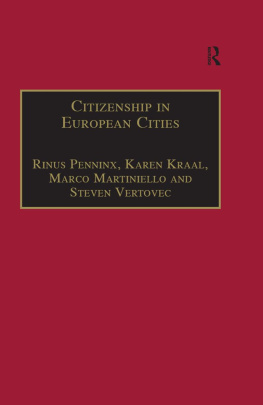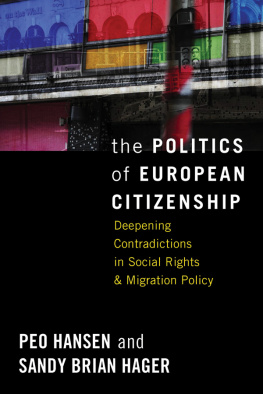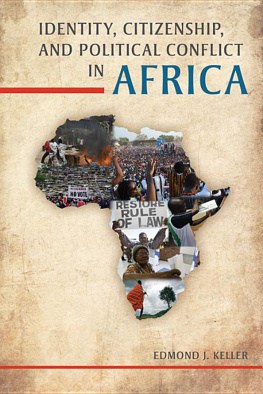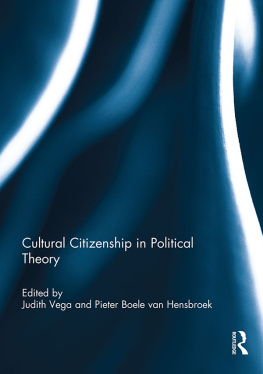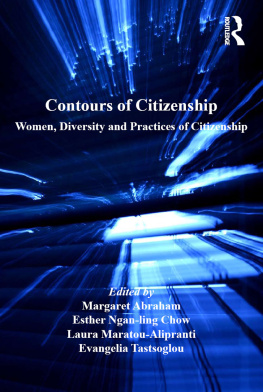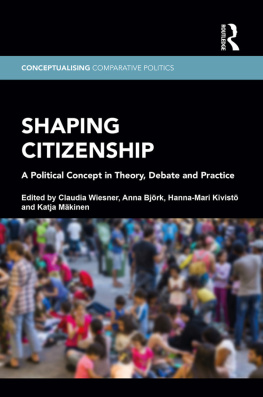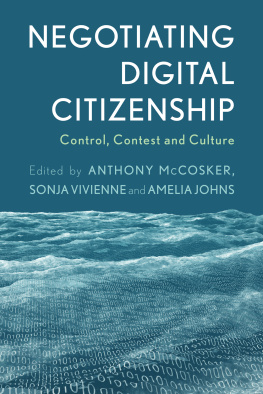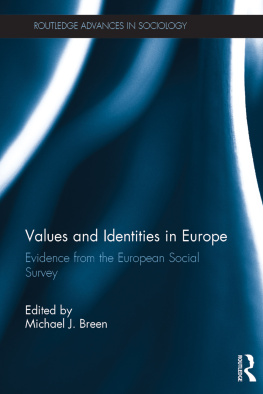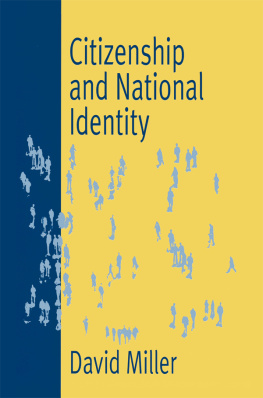NEGOTIATING POLITICAL IDENTITIES
Monitoring Change in Education
Series Editor:
J. Mark Halstead
University of Huddersfield, UK
Change is a key characteristic of the worlds of business, education and industry and the rapidity of change underlines an urgent need to analyze, evaluate and, where appropriate, correct its direction. The series is aimed at contributing to this analysis. Its unique contribution consists of making sense of changes in education and in offering a timely and considered response to new challenges; the series, therefore, focuses on contemporary issues and does so with academic rigour.
Other titles in the series
Risk, Education and Culture
Edited by
Andrew Hope and Paul Oliver
ISBN 978 0 7546 4172 8
Race and Ethnicity in Education
Ranjit Arora
ISBN 978 0 7546 1441 8
Mentoring in Education
An International Perspective
Edited by
Cedric Cullingford
ISBN 978 0 7546 4577 1
Young Disabled People
Aspirations, Choices and Constraints
Sonali Shah
ISBN 978 0 7546 7422 1
Computers, Schools and Students
The Effects of Technology
Cedric Cullingford and Nusrat Haq
ISBN 978 0 7546 7821 2
Negotiating Political Identities
Multiethnic Schools and Youth in Europe
DANIEL FAAS
Trinity College Dublin, Ireland
First published 2010 by Ashgate Publishing
Published 2016 by Routledge
2 Park Square, Milton Park, Abingdon, Oxon OX14 4RN
711 Third Avenue, New York, NY 10017, USA
Routledge is an imprint of the Taylor & Francis Group, an informa business
Copyright 2010 Daniel Faas.
Daniel Faas has asserted his right under the Copyright, Designs and Patents Act, 1988, to be identified as the author of this work.
All rights reserved. No part of this book may be reprinted or reproduced or utilised in any form or by any electronic, mechanical, or other means, now known or hereafter invented, including photocopying and recording, or in any information storage or retrieval system, without permission in writing from the publishers.
Notice:
Product or corporate names may be trademarks or registered trademarks, and are used only for identification and explanation without intent to infringe.
British Library Cataloguing in Publication Data
Faas, Daniel.
Negotiating political identities : multiethnic schools and
youth in Europe. -- (Monitoring change in education)
1. Multicultural education-Europe. 2. Minority youth-
Education--Great Britain-Case studies. 3. Minority
youth--Education--Germany--Case studies. 4. Ethnicity in
children. 5. Nationalism and education--Europe.
I. Title II. Series
373.1829-dc22
Library of Congress Cataloging-in-Publication Data
Faas, Daniel.
Negotiating political identities : multiethnic schools and youth in Europe / by Daniel Faas.
p. cm. -- (Monitoring change in education)
Includes index.
ISBN 978-0-7546-7844-1 (hardback) -- ISBN 978-0-7546-9664-3
(ebook) 1. Education--Social aspects--Germany--Case studies. 2. Education--Social
aspects--England--Case studies. 3. Education and state--Germany--Case studies. 4.
Education and state--England--Case studies. 5. Multiculturalism--Germany--Case studies.
6. Multiculturalism--England--Case studies. 7. Group identity--Germany--Case studies.
8. Group identity--England--Case studies. I. Title.
LC191.8.G3F33 2010
370.1170943--dc22
2009046927
ISBN 978-0-754-67844-1 (hbk)
ISBN 978-1-315-59766-9 (ebk)
Contents
To my family, with love
List of Figures and Tables
Figures
Tables
Foreword
Questions of migration, ethno-religious belonging, nation-making and citizenship are key elements of todays rapid social and cultural transformations. These aspects of todays world are accompanied by pervasive feelings of anxiety, risk and dislocation, as well as new opportunity. The process of globalization means old polarities between First and Third World are less relevant and have been replaced with mass movements of capital, technologies and people. Shifting political mobilizations and the remaking of policies within these conditions of late modernity have witnessed a wider move from the politics of distribution to the politics of recognition, in ways that affect a diverse range of established migrants, faith communities, economic migrants and asylum seekers.
The fragmentation of social relations brought on by globalizing processes is reflected in the increasing range of social and cultural explanations of our rapidly changing social world. Much contemporary social and cultural theory examining these issues has been developed at an abstract level that is not embedded in old institutional sites (such as workplaces or schools) or in individual subjects lived realities. Herein lies the contribution of this book, which reconnects that which has become disconnected schooling and social theory. The authors theory-led comparative methodology wonderfully narrates the centrality of modern European schooling for the making and remaking of societies around a dynamic and contested notion of multiculturalism.
Negotiating Political Identities presents a sociological analysis of the postwar historical relationships between national, European and multicultural political and educational agendas in Germany and England, and extends the findings to transatlantic discussions of immigrant incorporation. The research challenges, with a generous and creative reading, earlier work in the field of inquiry that has tended to focus on a more conventional approach in examining notions of citizenship, multiculturalism and belonging. Simultaneously, the author makes a substantial contribution to the field, offering real insights, at an epistemologica! level, into a contemporary understanding of discursive constructions of a multi-narrative sense of citizenship that explores the interconnecting social forces of school policies, peer groups, social class and the accompanying different histories of migration. His specific focus is a fascinating narrative centred on identity formation among young people 15-year-old ethnic majority and Turkish minority students located within schools. The book takes up an area in urgent need of critical exploration within conditions of late modernity, the institutional and self-positioning of ethnic majority and Turkish minority secondary students with reference to local, national, and European political agendas. This important book expands sociological understanding of contemporary youth by placing negotiated political identities at its centre. Even more impressively, the study serves to interrogate established theory at a macro-level by delving deeply into the reinforcement of national agendas within an English context, and contrasting it to Germanys prioritization of European agendas. There is a real sense here of a new generation of writing around the institutionally situated national/ethnic self, one which applies not only to European scholarship on immigrant incorporation, but to transatlantic dialogues around the integration of the second generation as well.
This challenging text, combining scholarship and accessibility, will appeal to multiple audiences, including academics, policy-makers, and the general reader.


